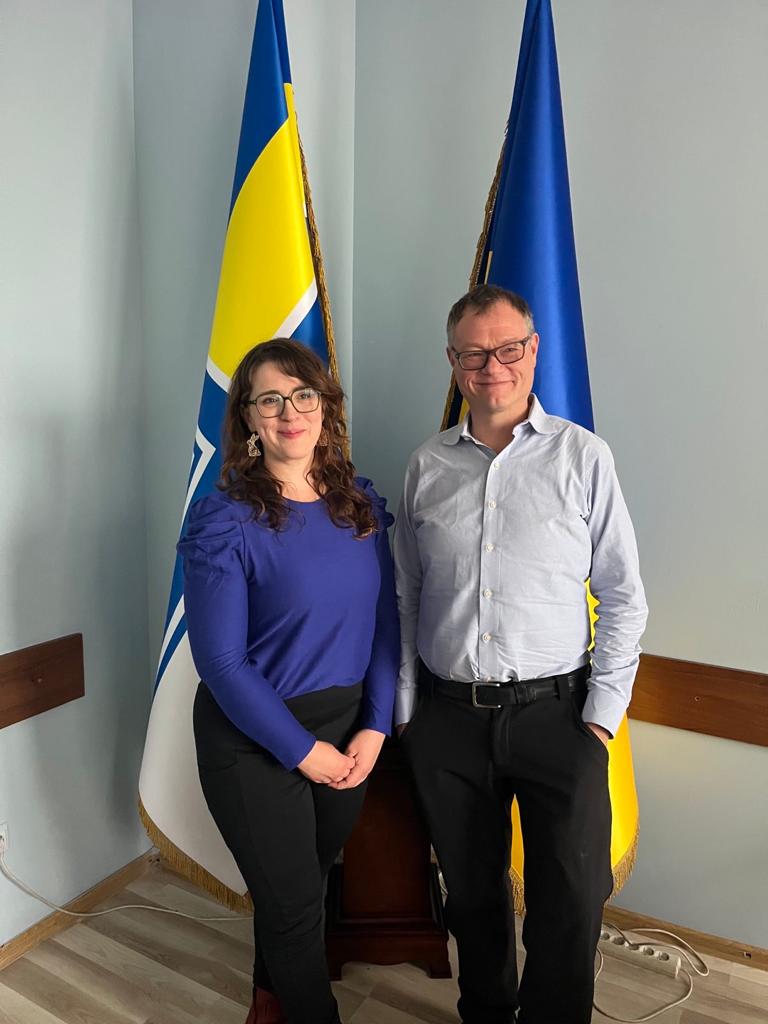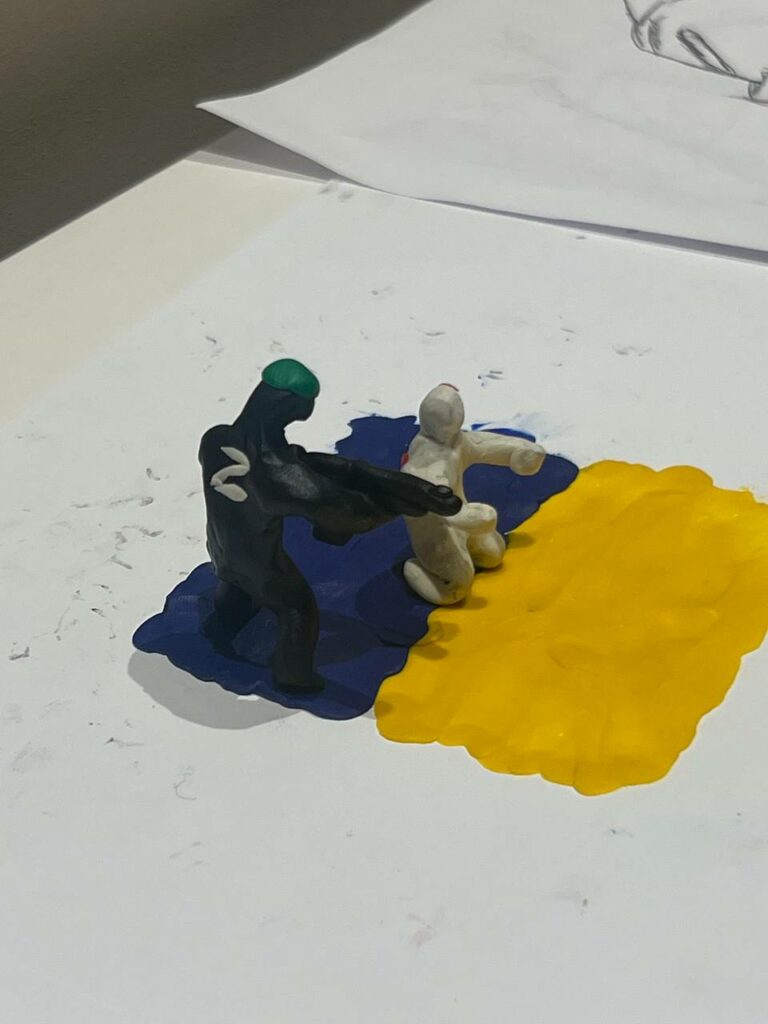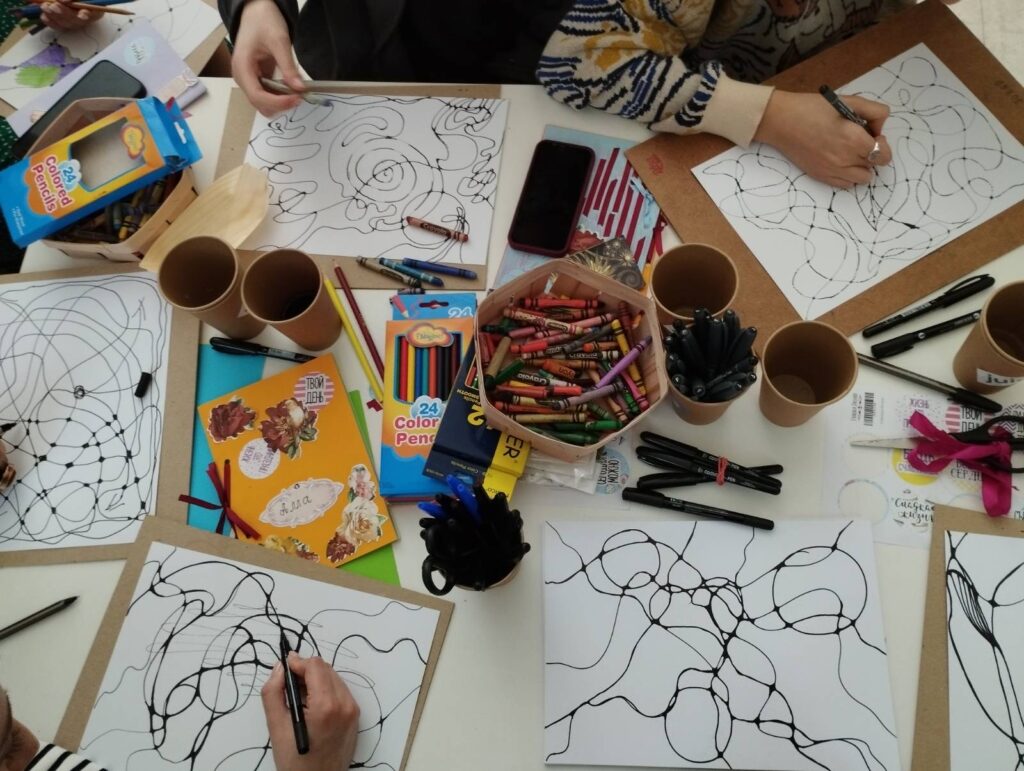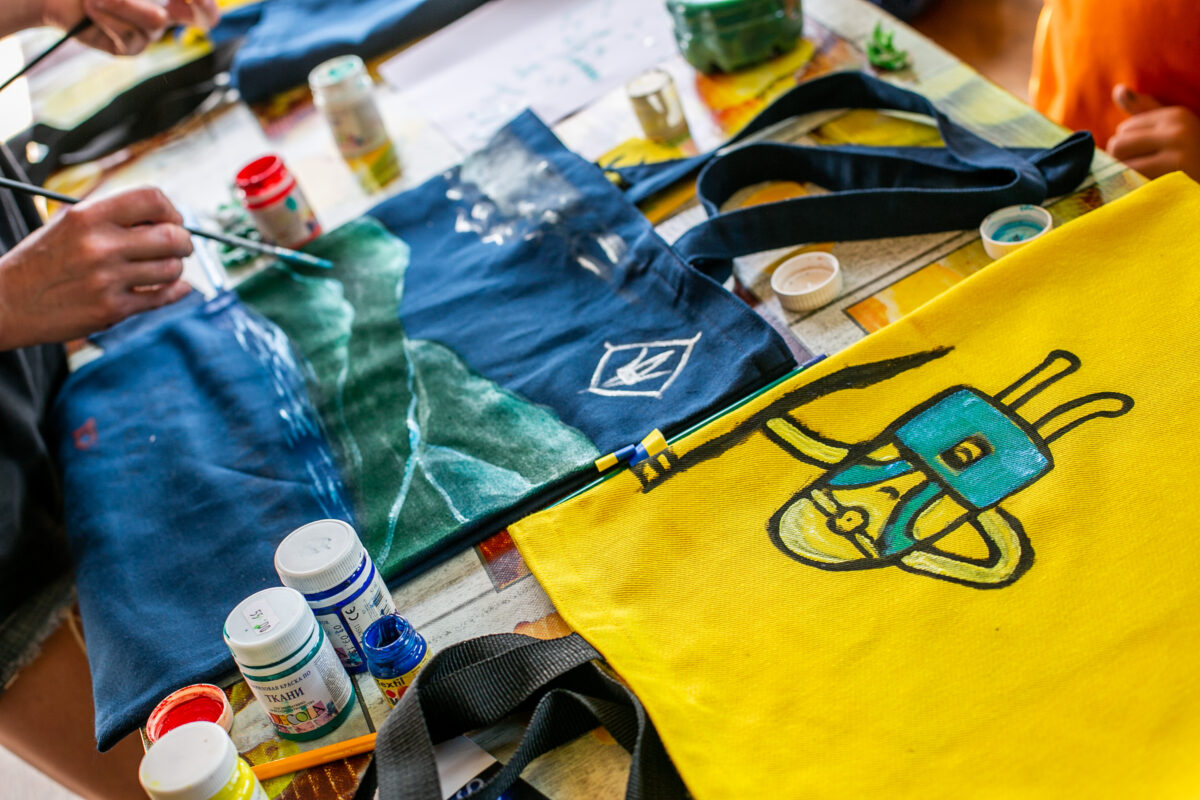Marco Gruelle visited nine Ukrainian cities in two weeks in April, a whirlwind of a trip, but one that is incredibly important to DTCare, the nonprofit that ships badly needed supplies to the besieged nation as part of its humanitarian work. And he’ll do it again in June.
DTCare’s president knows from past international humanitarian projects that good partners ensure those donated supplies make it to the right places where they are most needed, and you must visit to ensure that projects are running smoothly.
The nonprofit’s two main focuses right now are the medical supply and surgical kit distributions and the art therapy programs DTCare has worked on, both critical needs, Gruelle said.
“I am happy to report that the goods we sent on the medical supply side are getting to the right places, and the right people taking control of them when they get there,” he said.
To date DTCare has sent 30 air shipments and more by ocean freighters, which Gruelle said averages out to one shipment every other week. Ocean freight shipments move 30 to 40 times as much as DTCare can by air and at the same price, he said.
When the war started, Gruelle said he and his staff plotted out several different destination points. Ocean freight shipments unload at a port in Gdyinia, Poland, where the containers are then stripped and materials loaded into trucks. By air, the shipments land at the Warsaw airport, then are loaded onto trucks. DTCare also can deliver to Romania and Slovakia.
“We have a significant amount of past performance in various countries, which has been helpful in this situation, and experience in logistics in dangerous places,” he said. That means avoiding pitfalls that other nongovernmental agencies, or NGOs, can fall into.
“Many people just trust other people too much. That’s not unfounded. … Many people don’t have boots on the ground. Trust can be misused by people in a country. The problem can be exacerbated …. One bad actor can affect an entire operation.”
He said another huge pitfall is the last mile for those shipments. “Whole warehouses are still full in Ukraine and not being able to be allocated properly. Even if it is a government office, it might not be the right office for it or able to get it to the most affected populations. Relief goods aren’t relief goods at all until they reach the intended participants,” Gruelle said.
For example, DTCare vetted two main partners, the Sunflower Project and ZHP, the Polish Scouting organization, and that has worked very well because “we treat this as a business, a family run business” — lessons learned from his family’s international logistics company, DTGruelle, based in Moon.
Founded in 2019, DTCare has operations in Lebanon, South Africa, Zimbabwe, Bosnia and Herzegovina, and Panama as well as Ukraine, run by a staff of 12 with eight based in those countries, supplemented by volunteers.
“Just like any business, your relations — especially in the international field — are your strongest bond and differentiate you from other NGOs,” Gruelle said. “We are much more focused on the actual action and delivering things and making a difference. And none of that can happen if you don’t have good relationships with people here in the states and overseas. You let your expectations be known, you follow through, and you prove to be a good partner. “
The Sunflower Project has been very helpful, he said, in what he termed the Ukrainian second line and the art therapy programs. “In all the cities and towns on the edge of the war zone and front, they are almost completely populated by people, mostly old people, who won’t move. [They’ve had no] water, no gasoline, no supplies for months. Just a few [NGOs] serving them, such as the Sunflower Project,” Gruelle explained.
That organization identified a need for adult diapers. At the end of April, DTCare shipped those off plus food in one shipment, and another with more medical supplies and surgical kits. It is not licensed to send medications, another major need.
Gruelle said the Sunflower Project has done it all. “They even brought food to a zoo,” he said. “The animals are starving. On a daily basis, they are delivering to families, children, old people, all these people in need. What posting [of their work] got the most views? The delivery to the zoo.”

During his trip, Gruelle visited Ternopil Medical University, which has efficiently received, cataloged and distributed the large number of surgical kits and other medical items it has sent via ocean freight.
He also checked hospitals in the towns of Zhytomyr, Chudniv and Andrushivka preparing to again take in all the expected overflow of injured soldiers. “They have beds and blankets but nothing else. They need supplies, medical staff. There’s not a line of doctors heading there,” he said.
Other partners include the United Ukraine volunteer fund, which DTCare has helped with supplies for front-line medics, and the Andreev Foundation, aiding it with clothing and hygiene supplies.
Once the shipments arrive and are taken to warehouses, the next step is moving them, which Gruelle called a very dangerous job. “They have to use small vehicles. Then once they reach their destination, they use sprinter vans. Drives that took two hours now take five to seven and are dangerous. You’re a target when trying to reach the front lines. It’s dangerous, and it involves personalities and people who are a cut different. They are strictly not risk-averse people. That can-do attitude is what is keeping Ukraine together these days. Without them the situation would be a lot worse.”
Gruelle spent some time visiting a friend who suffered a head injury while delivering supplies. He did receive medical attention and a solution for a traumatic brain injury that will help him recover.
As far as the Scouts, Gruelle said ZHP, which has an extensive network of warehouses and distribution points, “has this great army of boys. For example, they will be sitting there waiting at the train system in Krakow, waiting for the families to arrive, with food, supplies, resource information to give them.”

The art therapy programs target all ages and soldiers. Gruelle visited 14 internally displaced persons centers and orphanages in Lviv run by partner NGO Care in Action. In Odesa, DTCare is working with Norwegians who are running a hostel for IDPs with UNICEF, the Odesa Fine Arts, the Children’s Hospital of Odesa and a Jewish orphanage that just reopened.
Gruelle met with Ukrainian officials to push a two-year art therapy degree program to provide training and recruit more staff. DTCare has also teamed with the International Humanitarian University of Odesa to teach an introductory art therapy class and to conduct an art therapy session for its students.
One unfortunate aspect of this is that the country’s Ministry of Culture has taken the reins of art therapy, Gruelle said, instead of education and psychological associations, but he is resolved to “slog it through” with the help of the Art Therapy Association of Ukraine and other groups.
DTCare started it first pilot program for art therapy in Odesa months ago in conjunction with the Ukrainian Navy. “We proved to the Navy that art therapy was helpful not only for women and children but also for soldiers,” Gruelle noted in a report. “Even though we knew that art therapy is effective on all age groups and demographics, it was very important for us to prove that this also worked on soldiers and POWs. The stigma surrounding mental health is still very strong in Ukraine, particularly in the military. It is essential that soldiers receive therapy in a respectful and impactful manner. If they do not, there will be many bad outcomes.”
Offering art therapy correctly guides DTCare’s work, even it if can be a grueling process to hire art therapists and train them. “We have a mentorship program for them,” Gruelle said. “It has to be done right. We have to build it up slowly and surely, reporting back to our stakeholders.”
Going where other people don’t go is the hallmark of what Gruelle said he has done for years and what DTCare is doing as well. His logistics background is a major help, of course.
“I had to do a little bit of teaching,” he laughed, when he visited a Kyiv warehouse. “The young lawyer there can figure out a whole lot of things. Of course, Dmytro, he didn’t know what he was doing. I showed him how to reorganize, the process of sending out the supplies, keeping an inventory. I literally had to teach him from the ground up.”
Gruelle said DTCare had to rent another warehouse in Kyiv, and he found a bit of confusion with some goods being sent to hospitals and other hospitals coming to the warehouse to look through the supplies.
So far Gruelle estimates the Ukrainian campaign has cost DTCare $350,000, and he admits he is “not so good at getting donations, so it’s been mostly self-funded, [and that’s] not sustainable financially in the long run.” He has been thankful to the donors who have come forward, including from the Ukrainian and Polish churches in Carnegie and the Pittsburgh Ukrainian Relief Coalition.
Matt Blackburn, president of the PURC board, called DTCare “a wonderful organization. They came in and did a presentation for us. They vet their projects, too, as well,” which brought about the PURC support.
DTCare will hold a spring cleaning drop-off donation drive Saturday, May 13, from 9 a.m. until noon at its headquarters, 301 Moon Clinton Drive, Moon 15108.
When Gruelle heads back to Ukraine next month, he and program manager Courtney Robson have been invited to speak at a ZHP Scouting conference in Warsaw to talk about the partnership with the Scouts.
“[We’ll explain how] people can make a positive impact,” he said. “This is better than any medal.”

Helen is a copy editor at the Pittsburgh Post-Gazette, but she's currently on strike. Contact her at hfallon@unionprogress.com.



